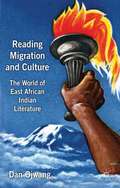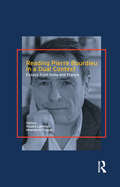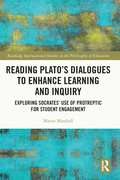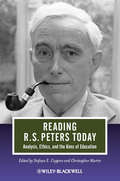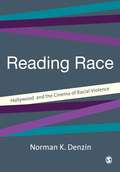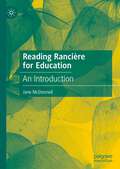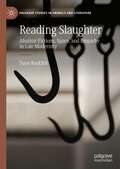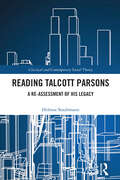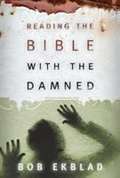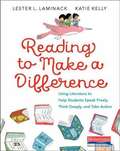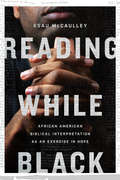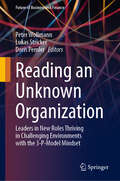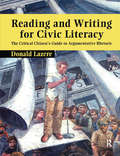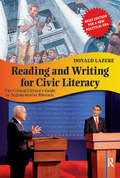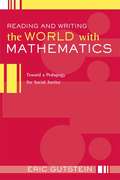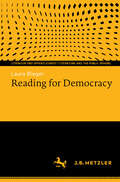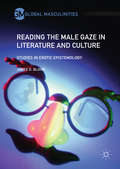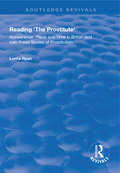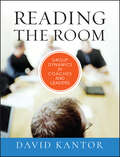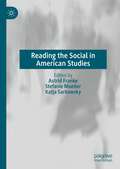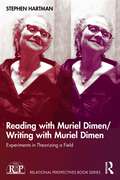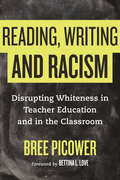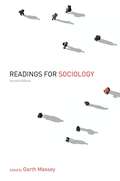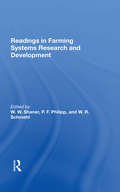- Table View
- List View
Reading Migration and Culture
by Dan OjwangThis book uses the uniquely positioned culture of East African Asians to reflect upon the most vexing issues in postcolonial literary studies today. By examining the local histories and discourses that underpin East African Asian literature, it opens up and reflects upon issues of alienation, modernity, migration, diaspora, memory and nationalism.
Reading Pierre Bourdieu in a Dual Context: Essays from India and France
by Roland Lardinois1. The Crises of Imperial Societies Christophe Charle 2. Thinking the State with Bourdieu and Foucault U. Kalpagam 3. Bourdieu’s Theory of the Symbolic: Traditions and Innovations Sheena Jain 4. The Field of Indian Knowledge in France in the 1930s Roland Lardinois 5. Literature and Politics During the German Occupation Gisele Sapiro 6. Symbolic Violence and Masculine dominance in the Vichy Regime Francine Muel-Dreyfus 7. Habitus, Performance and Women’s Experience in Everyday Life Meenakshi Thapan 8. Pierre Bourdieu and Anthropology Alban Bensa 9. Documents and Testimony: Violence in the Bombay Riots Deepak Mehta Index
Reading Plato's Dialogues to Enhance Learning and Inquiry: Exploring Socrates' Use of Protreptic for Student Engagement (Routledge International Studies in the Philosophy of Education)
by Mason MarshallThis scholarly volume proposes protreptic as a radically new way of reading Plato’s dialogues leading to enhanced student engagement in learning and inquiry. Through analysis of Platonic dialogues including Crito, Euthyphro, Meno, and Republic, the text highlights Socrates’ ways of fostering and encouraging self-examination and conscionable reflection. By focusing his work on Socrates’ use of protreptic, Marshall proposes a practical approach to reading Plato, illustrating how his writings can be used to enhance intrinsic motivation amongst students, and help them develop the thinking skills required for democratic and civic engagement. This engaging volume will be of interest to doctoral students, researchers, and scholars concerned with Plato’s dialogues, the philosophy of education, and ancient philosophy more broadly, as well as post-graduate students interested in moral and values education research.
Reading R. S. Peters Today: Analysis, Ethics, and the Aims of Education (Journal of Philosophy of Education #21)
by Christopher Martin Stefaan E. CuypersReading R. S. Peters Today: Analysis, Ethics and the Aims of Education reassesses British philosopher Richard Stanley Peters’ educational writings by examining them against the most recent developments in philosophy and practice. Critically reassesses R. S. Peters, a philosopher who had a profound influence on a generation of educationalists Brings clarity to a number of key educational questions Exposes mainstream, orthodox arguments to sympathetic critical scrutiny
Reading Race: Hollywood and the Cinema of Racial Violence (Published in association with Theory, Culture & Society)
by Norman K. DenzinIn this insightful book, one of America's leading commentators on culture and society turns his gaze upon cinematic race relations, examining the relationship between film, race and culture. Norman K Denzin argues that the cinema, like society, treats all persons as equal but struggles to define and implement diversity, pluralism and multiculturalism. He goes on to argue that the cinema needs to honour racial and ethnic differences, in defining race in terms of both an opposition to, and acceptance of, the media's interpretations and representations of the American racial order. Acute, richly illustrated and timely, the book deepens our understanding of the politics of race and the symbolic complexity of segregation and discrimination.
Reading Rancière for Education: An Introduction
by Jane McDonnellThis book introduces readers to the writing of the French philosopher, Jacques Rancière, and discusses the uptake of his work in education. Written from a personal perspective, the book tells the story of the author’s engagement with Rancière’s writing as an educational researcher. The first part of the book introduces Rancière’s interventions on democracy and politics, art and aesthetics, emancipation, and education. The second part of the book analyses how Rancière’s writing has been taken up in considerations of emancipatory, democratic, and political education, art(s) education, and innovative work in educational research. The final part of the book appraises the significance of Rancière’s writing for education and considers the difficult task of applying his insights to educational scholarship.
Reading Slaughter: Abattoir Fictions, Space, and Empathy in Late Modernity (Palgrave Studies in Animals and Literature)
by Sune BorkfeltReading Slaughter: Abattoir Fictions, Space, and Empathy in Late Modernity examines literary depictions of slaughterhouses from the development of the industrial abattoir in the late nineteenth century to today. The book focuses on how increasing and ongoing isolation and concealment of slaughter from the surrounding society affects readings and depictions of slaughter and abattoirs in literature, and on the degree to which depictions of animals being slaughtered creates an avenue for empathic reactions in the reader or the opportunity for reflections on human-animal relations. Through chapters on abattoir fictions in relation to narrative empathy, anthropomorphism, urban spaces, rural spaces, human identities and horror fiction, Sune Borkfelt contributes to debates in literary animal studies, human-animal studies and beyond.
Reading Talcott Parsons: A Re-Assessment of His Legacy (Classical and Contemporary Social Theory)
by Helmut StaubmannAddressing the neglect of the work of Talcott Parsons, the complexity of whose thought and the opacity of whose writing style can prove daunting, this book provides a comprehensible account of the major theoretical accomplishments in his work and the reasons for which his legacy remains important to contemporary sociological debates. With attention to the unification of theoretical concepts for the humanities, basic methodological issues such as empiricism and functional analysis, the definition and status of culture, the interaction between the individual and society and the question of modernity and societal change, Reading Talcott Parsons: A Re-Assessment of His Legacy offers an orientation in the work of one of the 20th century’s most important sociologists and explores the reason for which his contributions to the discipline are of enduring importance. As such it will appeal to scholars and students across the social sciences with interests in social theory, social research methodology and the history of sociology.
Reading The Bible With The Damned
by Bob EkbladExploring the challenges that both the churched and the unchurched have faced regarding giving and receiving the word of God, Bob Ekblad encourages us all to learn to read the Bible together as a whole. In this compelling book, he reflects on how Christians have often found it difficult to proclaim God's good news to every realm of society, while those who have needed it most have frequently deemed themselves unworthy due to social circumstances or sinfulness. In Reading the Bible with the Damned, Ekblad offers concrete advice on how to bridge this gap through a variety of insights ultimately leading to spiritual transformation. This book is full of examples of how Scripture changes lives for those who attend Bible studies and for those who lead them, offering practical suggestions on many passages from the Old and New Testaments.
Reading To Make A Difference: Using Literature To Help Students Speak Freely, Think Deeply, And Take Action
by Lester L. Laminack Katie Kelly"This book is a gift to teachers who want to know how best to incorporate diverse literature into their classrooms. It translates rhetoric about diverse books into practical actions. Teachers will find it a valuable resource, full of examples of actual classroom practices and questions for reflecting, as well as suggestions of good books to share with students. It takes the study of diverse texts well beyond the "food, festivals and folklore" focus of the early days of attention to multicultural literature to a consideration of literature as a catalyst for social action. The thematic emphases for the chapters are broad enough to apply to texts that represent diverse cultures, but specific enough to work in diverse classrooms, from elementary school to the college level." - Rudine Sims Bishop, Professor Emerita of Education at The Ohio State University "In far too many schools, our effort to be more inclusive begins and ends with book selection. In Reading to Make a Difference, Lester and Katie teach us that this is not enough. This book is an urgent reminder that even the most powerfully diverse bookshelf cannot mask the damage done to children by practices and curriculum that fails to see them. Reading to Make a Difference shows us how to combine powerful books with purposeful, equitable practice." - Cornelius Minor Books as bridges enable readers to speak freely, think deeply, and take action. In Reading to Make a Difference, Lester and Katie build on the work of Rudine Sims Bishop, extending the notion of books as windows, mirrors, and doors. They offer a pathway that can lead students to take action for social justice causes. They show you how to move beyond exposing your students to diverse children's literature by offering an instructional framework that is applicable to any topic and can be adapted to your own classroom or community. Lester and Katie will show you how to: select and share text sets in a variety of reading experiences including read-aloud, small group, book clubs, and independent reading creating a scaffold for students to share their connections with a character, situation, issue, or topic invite students to pause and reflect provide opportunities for students to take action individually or collectively in a way that can make a difference. Each chapter highlights different classrooms in action and concludes with a wealth of suggested resources, both picture books and chapter books, along with helpful guidelines on how to choose text sets that reflect the needs, interests, and backgrounds of your students. The right book at the right time can open doors of possibility for a better world. Armed with an understanding of who your students are, where they come from, and what matters to them, you can cultivate children as thoughtful, caring citizens, and empower them to become lifelong agents of change.
Reading While Black: African American Biblical Interpretation as an Exercise in Hope
by Esau McCaulleyGrowing up in the American South, Esau McCaulley knew firsthand the ongoing struggle between despair and hope that marks the lives of some in the African American context. A key element in the fight for hope, he discovered, has long been the practice of Bible reading and interpretation that comes out of traditional Black churches. This ecclesial tradition is often disregarded or viewed with suspicion by much of the wider church and academy, but it has something vital to say. Reading While Black is a personal and scholarly testament to the power and hope of Black biblical interpretation. At a time in which some within the African American community are questioning the place of the Christian faith in the struggle for justice, New Testament scholar McCaulley argues that reading Scripture from the perspective of Black church tradition is invaluable for connecting with a rich faith history and addressing the urgent issues of our times. He advocates for a model of interpretation that involves an ongoing conversation between the collective Black experience and the Bible, in which the particular questions coming out of Black communities are given pride of place and the Bible is given space to respond by affirming, challenging, and, at times, reshaping Black concerns. McCaulley demonstrates this model with studies on how Scripture speaks to topics often overlooked by white interpreters, such as ethnicity, political protest, policing, and slavery. Ultimately McCaulley calls the church to a dynamic theological engagement with Scripture, in which Christians of diverse backgrounds dialogue with their own social location as well as the cultures of others. Reading While Black moves the conversation forward.
Reading an Unknown Organization: Leaders in New Roles Thriving in Challenging Environments with the 3-P-Model Mindset (Future of Business and Finance)
by Peter Wollmann Lukas Stricker Doris PemlerThis book focuses on "Organizational Intelligence" and its connection to the Three-Pillar Model, a framework developed by a global community of over 60 professionals from various sectors and published by Springer Nature. The model centers on three vital pillars for navigating the volatile, uncertain, complex, and ambiguous (VUCA) world of organizational design and leadership: Sustainable Purpose, Travelling Organization, and Connectivity.At its core, the book features interviews with executive leaders, including those in the C-Suite, who have recently assumed new roles in new organizations or have done so in their careers. The interviews are diverse and anonymized to encourage candid responses. The book explores how these leaders quickly gain a comprehensive understanding of their organizations, with a focus on coping with change, transformation, sustainability, and UN SDG coverage.Offering real case study-based guidance, the book does not seek to provide a one-size-fits-all methodology but instead encourages readers to tailor its insights to their unique circumstances. It is a valuable resource for mentoring and coaching purposes.
Reading and Writing Disability Differently
by Tanya TitchkoskyMixing rigorous social theory with concrete analysis, Reading and Writing Disability Differently unpacks the marginality of disabled people by addressing how the meaning of our bodily existence is configured in everyday literate society.Tanya Titchkosky begins by illustrating how news media and policy texts reveal dominant Western ways of constituting the meaning of people, and the meaning of problems, as they relate to our understandings of the embodied self. Her goal is to configure disability as something more than a problem, and beyond simply a positive or a negative, and to treat texts on disability as potential sites to examine neo-liberal culture. Titchkosky holds that through an exploration of the potential behind limited representations of disability, we can relate to disability as a meaningful form of resistance to the restricted normative order of contemporary embodiment.Incorporating a textual analysis of ordinary depictions of disability, this innovative study promises to represent embodied differences in new ways and alter our imaginative relations to the politics of the body.
Reading and Writing for Civic Literacy: The Critical Citizen's Guide to Argumentative Rhetoric (Cultural Politics And The Promise Of Democracy Ser.)
by Donald Lazere'Lazere's [book] is heaven-sent and will provide a crucial link in the chain of understanding how conflicts are structured and, most importantly, how they can be rationally addressed - a healthy antidote to the scepticism that has become so pervasive in academic life.' Alan Hausman, Hunter College This innovative book addresses the need for college students to develop critical reading, writing, and thinking skills for self-defence in the contentious arena of American civic rhetoric. In a groundbreaking reconception of composition theory, it presents a comprehensive critical perspective on American public discourse and practical methods for its analysis. Exercises following the text sections and readings help students understand the ideological positions and rhetorical patterns that underlie opposing viewpoints in current controversies - such as the growing inequality of wealth in America and its impact on the finances of college students - as expressed in paired sets of readings from the political left and right. Widely debated issues of whether objectivity is possible and whether there is a liberal or conservative bias in news and entertainment media, as well as in education itself, are foregrounded as topics for rhetorical analysis.
Reading and Writing for Civic Literacy: The Critical Citizen's Guide to Argumentative Rhetoric (Cultural Politics and the Promise of Democracy)
by Donald LazereThis brief edition of a groundbreaking textbook addresses the need for college students to develop critical reading, writing, and thinking skills for self-defense in the contentious arena of American civic rhetoric. Designed for first-year or more advanced composition and critical thinking courses, it is one-third shorter than the original edition, more affordable for students, and easier for teachers to cover in a semester or quarter. It incorporates up-to-date new readings and analysis of controversies like the growing inequality of wealth in America and the debates in the 2008 presidential campaign, expressed in opposing viewpoints from the political left and right. Exercises help students understand the ideological positions and rhetorical patterns that underlie such opposing views. Widely debated issues of whether objectivity is possible and whether there is a liberal or conservative bias in news and entertainment media, as well as in education itself, are foregrounded as topics for rhetorical analysis.
Reading and Writing the World with Mathematics: Toward a Pedagogy for Social Justice (Critical Social Thought)
by Eric GutsteinMathematics education in the United States can reproduce social inequalities whether schools use either "basic-skills" curricula to prepare mainly low-income students of color for low-skilled service jobs or "standards-based" curricula to ready students for knowledge-intensive positions. And working for fundamental social change and rectifying injustice are rarely included in any mathematics curriculum. <P><P>Reading and Writing the World with Mathematics argues that mathematics education should prepare students to investigate and critique injustice, and to challenge, in words and actions, oppressive structures and acts. Based on teacher-research, the book provides a theoretical framework and practical examples for how mathematics educators can connect schooling to a larger sociopolitical context and concretely teach mathematics for social justice.
Reading for Democracy (Literatur und Öffentlichkeit / Literature and the Public Sphere)
by Laura BiegerIs literature of political use, and if yes, how might this use be defined? “Reading for Democracy” addresses this question in a series of essays, with topics ranging from ‘reading as a political practice’ to ‘the relational aesthetics of literary engagement’, from ‘the public sphere as a space of appearance’ to ‘public intellectuals and the predicament of popularity’, from ‘Jesmyn Ward’s poetics of breathing while Black’ to ‘the art of the essay in the digital age’. In considering these topics, it engages with a range of philosophical, sociological, media and literary critical works by scholars including Jürgen Habermas, Michael Warner, John Dewey, Hannah Arendt, Jean-Paul Sartre, Theodor Adorno, Nicolas Bourriaud and Pierre Bourdieu. But the baseline of the essays collected in this volume is an understanding of literature as a social practice, a collective doing and making that involves a multiplicity of human and non-human actors (writers, readers, publishers, agents, book covers, prize committees, English departments, literary characters and styles, adaptations for stage and screen). In this framework, literary texts are not stable objects. They are bonding agents in a complex and shifting web of relations, and in this capacity they catalyze and channel the activities necessary to forge these relations (reading, writing, publishing, republishing, citing, reciting, reviewing, recommending). Moving back and forth between two shape-shifting actors—the reading public and a socially engaged literature—the assembled essays show how the political functions and uses of literature are defined from within this constellation; or, more precisely, through the collective and reflective forms of judgment, including aesthetic judgement, that are tried and institutionalized in practicing literature. And that are essential to negotiating the shape of the world. Which is what the political is all about.
Reading the Male Gaze in Literature and Culture
by James D. BloomThis book examines the phenomenon of 'the male gaze', a concept which has spread beyond academia and become a staple of cultural conversations across disciplinary boundaries. Male gazing has typically been disparaged and even stigmatized as a reflection of misogyny and an instrument of objectification, often justifiably so. But as this book argues and illustrates, male gazing can also be understood as an illuminating, intellectually engaging, aesthetically compelling, and even politically progressive practice. This study recounts how the author's own coming-of-an-age as a gazer became the basis for his long career teaching and writing about American fiction and poetry and poetry, canonical and contemporary, as well as about film, painting, TV, and rock-and-roll. It includes closely-reasoned analyses of work by James Baldwin, Rembrandt, Willa Cather, Philip Roth, Henry James, Charles Chesnutt, Bob Dylan, Robert Stone, Charles Chesnutt, Tim O'Brien, Edith Wharton, Theodore Dreiser, Frank O'Hara, Italo Calvino, John Schlesinger as well such cultural phenomena as the British Invasion of the 1960s, the Judgment of Paris in Greek mythology, the technology of seeing (kaleidoscopes, microscopes, telescopes) and the concept of 'objectification' itself.
Reading the Prostitute: Appearance, Place and Time in British and Irish Press Stories of Prostitution (Routledge Revivals)
by Lorna RyanFirst published in 1997, this study aims to forge new connections between debates on prostitution, media processes and everyday life in its exploration of depictions of female prostitution in British and Irish broadsheet newspapers between 1987 and 1991. Lorna Ryan first examines a range of discourses on prostitution before proceeding to areas including signals of prostitution and images in the press. Encompassing both textual and visual analyses, Ryan demonstrates that these newspapers relied on appearance, place, time, motive and intent in categorising women as prostitutes.
Reading the Room
by David KantorPraise for Reading the Room "If you believe, as I do, that tackling our toughest problems in organizations and societies will require significant advances in the human domain of how we think and interact, then you will find this book a wonderful resource for a healthier future. "-Peter Senge, senior lecturer, leadership and sustainability, MIT Sloan School of Management; and founding chair, Society for Organizational Learning (SoL) "A must-read for anyone truly interested in gaining access to and managing their own actions/behavior as well as all those we work with, live with, and interact with. It will shift the way you, others, and the world occur for you. "-Michael C. Jensen, Jesse Isidor Straus Professor of Business Administration, emeritus, Harvard Business School "David Kantor is one of the very few master innovators and theorists in organizational leadership. In this combined story and practice guide, Kantor helps leaders see the hidden dynamics of the groups they lead, and the personal and social factors that shape their relationships with those groups. " -Art Kleiner, editor in chief, strategy+business "Kantor addresses the fundamental issue that leaders are surprisingly inept in conversation and in managing groups. Leaders and managers at all levels should be learning these concepts in order to improve their own ability to analyze what is going on and react appropriately. "-Edgar H. Schein, professor emeritus, MIT Sloan School of Management; and author, Helping: How to Offer, Give, and Receive Help "An exceptional book in the true sense of the word. It stands alone in its grasp of what it takes to succeed as a leader. It's not simply about mastering the five forces, milking cash cows, accelerating experience curves, or even spurring disruptive innovation. It's about reading the room. Leaders who gain mastery of what David Kantor has to teach in this book will achieve true success, not just as leaders, but as people. " -Diana M. Smith, chief executive partner, New Profit Inc. ; and author, The Elephant in the Room: How Relationships Make or Break the Success of Leaders and Organizations "There are only a few wise masters in the world when it comes to any real understanding of leader-ship, and even fewer who share their secrets. David Kantor is one of them, and in Reading the Room we have brilliantly laid out before us both a unique lens and a highly practical method that will change for good the way you lead, and more, the way you think. Not to be missed!" -William Isaacs, author, Dialogue and the Art of Thinking Together; and senior lecturer, MIT Sloan School of Management
Reading the Social in American Studies
by Katja Sarkowsky Astrid Franke Stefanie MuellerReading the Social in American Studies offers a unique exploration of the advantages and benefits in using sociological terms and concepts in American literary and cultural studies and, conversely, in using literature—understood broadly—to uncover a microlevel of the social. Its temporal scope ranges from the early 19th to the 21st century, providing a historical dimension that is otherwise often missing from studies on the conjunction of literature and sociology. The contributors’ approaches include genre reflections as well as close readings, theoretical discussions of crucial sociological terms, and literary observations backed up by empirical sociological studies. The book will familiarize international readers with ideas on the social from both sides of the Atlantic, including scholarship of such figures as John Dewey, Georg Simmel, Norbert Elias, and Pierre Bourdieu.
Reading with Muriel Dimen/Writing with Muriel Dimen: Experiments in Theorizing a Field (Relational Perspectives Book Series)
by Stephen HartmanReading with Muriel Dimen/Writing with Muriel Dimen: Experiments in Theorizing a Field is a collection of reading and writing experiments inspired by the late feminist psychoanalyst Muriel Dimen. Each of the six projects that comprise this volume explores a stylistic and thematic manner of reading and responding to Dimen’s work, challenging the field to write outside the standardized edition, and covering a remarkable breadth of essential analytic topics, such as sex, gender, money, love and hate, and boundary violations. As an homage to Dimen’s quest to engage the personal and the political in the author’s craft, and in collaboration with Dimen’s endeavour to foster revolution across the psychosocial landscape that renders psychoanalysis its field, the authors offer readers a wild analysis of reading and writing. Providing a clear introduction to and exploration of Muriel Dimen’s groundbreaking work, this book will prove essential for scholars of psychoanalysis, cultural studies, and gender studies, as well as anyone seeking to understand Dimen’s influence on psychoanalytic practice today.
Reading, Writing, and Racism: Disrupting Whiteness in Teacher Education and in the Classroom
by Bree PicowerAn examination of how curriculum choices can perpetuate White supremacy, and radical strategies for how schools and teacher education programs can disrupt and transform racism in educationWhen racist curriculum "goes viral" on social media, it is typically dismissed as an isolated incident from a "bad" teacher. Educator Bree Picower, however, holds that racist curriculum isn't an anomaly. It's a systemic problem that reflects how Whiteness is embedded and reproduced in education. In Reading, Writing, and Racism, Picower argues that White teachers must reframe their understanding about race in order to advance racial justice and that this must begin in teacher education programs.Drawing on her experience teaching and developing a program that prepares teachers to focus on social justice and antiracism, Picower demonstrates how teachers' ideology of race, consciously or unconsciously, shapes how they teach race in the classroom. She also examines current examples of racist curricula that have gone viral to demonstrate how Whiteness is entrenched in schools and how this reinforces racial hierarchies in the younger generation.With a focus on institutional strategies, Picower shows how racial justice can be built into programs across the teacher education pipeline--from admission to induction. By examining the who, what, why, and how of racial justice teacher education, she provides radical possibilities for transforming how teachers think about, and teach about, race in their classrooms.
Readings For Sociology (Seventh Edition)
by Garth MasseyReadings for Sociology provides students with engaging selections that reveal the complexities of our social world and offer insights into sociological analysis. Garth Massey includes selections from popular and academic journals as well as lively book excerpts. All of the selections help students reach a new level of sociological understanding. While Readings for Sociology is comprehensive in its scope, offering a wide range of selections on the standard topics in the introductory course, its emphasis is particularly on social inequality and race, class, and gender.
Readings In Farming Systems Research And Development
by W. R. Schmehl W R Schmehl Perry F Philipp W. W. ShanerThis collection offers a comprehensive view of the commonalities and diversities of the farming systems research and development (FSR&D) approaches being applied around the world. The authors–among the leading practitioners in FSR&D–discuss conceptual frameworks, research methodology, data collection, and several ongoing FSR&D programs. The book is a must for anyone interested in gaining a concise, yet broad view of this new and growing field of research and its importance to small-scale farming in developing countries.
